

 It is increasingly clear that human activities are affecting the global climate, to the extent that many countries have declared a climate emergency and low lying counties fear for their very future, so it is vital that we find ways to reduce our greenhouse gas emissions.
It is increasingly clear that human activities are affecting the global climate, to the extent that many countries have declared a climate emergency and low lying counties fear for their very future, so it is vital that we find ways to reduce our greenhouse gas emissions.
Recycling | Toshiba | Epson | Sharp
As a Copier, Multifunction Printer and Managed Print Supplier, MiD has always provided solutions for companies who were looking for cheap ink, cheap toner and cheap photocopier rentals, but increasingly our clients are looking for suppliers that share their values and concerns for the environment, recycling and sustainability too. MiD and our partners approach this from multiple directions.
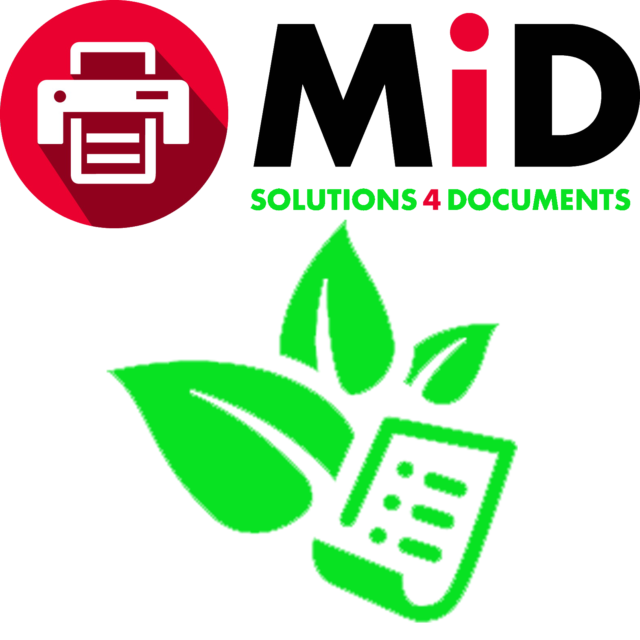
MiD has offered a toner cartridge recycling scheme for some years now, allowing clients to recycle not just the cartridges used in our multifunction printers, but in any other machines they have in the office, or even at home. This service is offered free of charge to any client who wishes to participate.
MiD actively seeks to partner with manufacturers and suppliers who make the environment, recycling and sustainability a priority in their own businesses.
MiD is growing rapidly, over 25% in the last 12 months. One aspect that many new customers find appealing is that MiD can help them take positive steps towards becoming a more sustainable company or organisation.
Already a market leader in technology, Toshiba uses recycled plastics and operates a Zero Carbon Scheme, putting them at the leading edge in their commitment to sustainable business practices.
To contribute to a more sustainable society and as a globally operating enterprise, Toshiba give the highest priority to conserving and protecting resources during every part of a product’s life-cycle. They take measures to conserve energy and resources and reduce the burden on the environment. At the same time, Toshiba understands the needs of customers, making sure that products and solutions not only have an ecological benefit, but also positively impact the economy and efficiency of businesses.
“At Toshiba we are committed to the environment. With the help of carbon offsetting experts CO2balance we have created a scheme which enables us to help combat CO2 emissions through the offsetting of all our products…. from procurement to delivery and beyond.”
Carbon offsetting allows for the investment in projects that save the emission of, or absorb an equivalent amount of CO2 to that of any Toshiba product’s footprint. Through this process emissions are balanced to become ‘Carbon Zero’ which allows for positive business activities without an overall detrimental effect to the environment.
Toshiba’s long history of innovation includes environmental awareness and, during design and manufacturing, Toshiba makes every effort to reduce the environmental impact of its activities, such as using recycled plastics in new components.
However there are always some unavoidable carbon emissions from the manufacture and operation of its products. The Carbon Zero scheme seeks to minimise the lasting impact of products on the environment as well as to provide support to communities in developing countries.
Toshiba’s Carbon Zero programme supports 14 of the 17 Sustainable Development Goals set by the United Nations to drive forward positive change over the next fourteen years. Toshiba supports a number of projects, including those listed below. Please download the brochure for more details of each project and the goals of the Carbon Zero Scheme.
Toshiba has now gone even further…
Many printed documents are only needed temporarily, e.g. to proof-read the content, or as a reminder to do something. Toshiba’s hybrid MFP system creates the opportunity to select erasable blue toner, so that when you don’t need your document anymore, you don’t have to throw the paper away, but can delete whatever was printed on it and reuse the sheet.
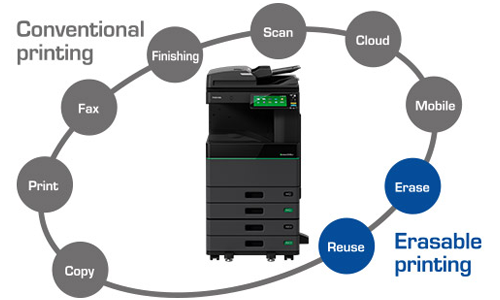 Besides saving costs for paper (purchase, storage, distribution and disposal) there is also a significant environmental benefit as you automatically reduce the carbon emission and water consumption, up to 10 liters per sheet of paper, which is generated during the paper production, not to mention the number of trees that are cut down each year to feed our paper habits.
Besides saving costs for paper (purchase, storage, distribution and disposal) there is also a significant environmental benefit as you automatically reduce the carbon emission and water consumption, up to 10 liters per sheet of paper, which is generated during the paper production, not to mention the number of trees that are cut down each year to feed our paper habits.
The Toshiba e-STUDIO5008LP series consists of three models designed to help businesses to operate efficiently, economically and ecologically, multifunction printers which easily connect, integrate, and simplify your workflows, as well as helping to save valuable resources. The Toshiba e-STUDIO5008LP series provides increased productivity and all the print, copy, scan, fax and file features you need for your daily business and save resources by reusing your paper with Toshiba’s Hybrid MFP.
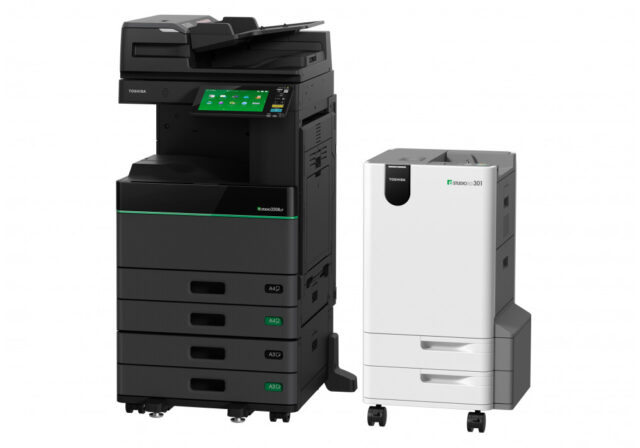
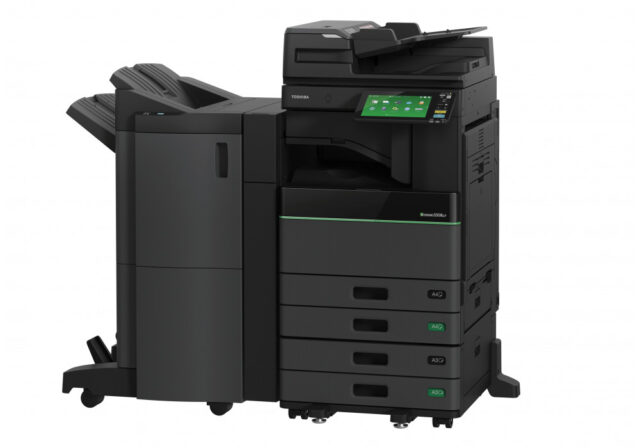
Setting your print device in sleep mode saves energy and reduces power consumption. But it can be frustrating and time consuming because it takes time to make the device ready to print documents.
Toshiba’s e-BRIDGE Next MFPs recover from sleep mode quickly while still saving energy, so your business doesn’t need to stop. Reducing wait-time also means less power is consumed, which is great for the environment. Energy consumption is reduced even further thanks to a dramatic reduction in power usage in sleep mode.
The Toshiba e-BRIDGE Next MFPs conform to many globally recognised environmental standards such as EPEAT and Blue Angel.
New energy saving technologies have been incorporated resulting in approximately 44% reduction in power consumption. Energy consumption is reduced even further, thanks to a dramatic reduction in power usage in super sleep mode.
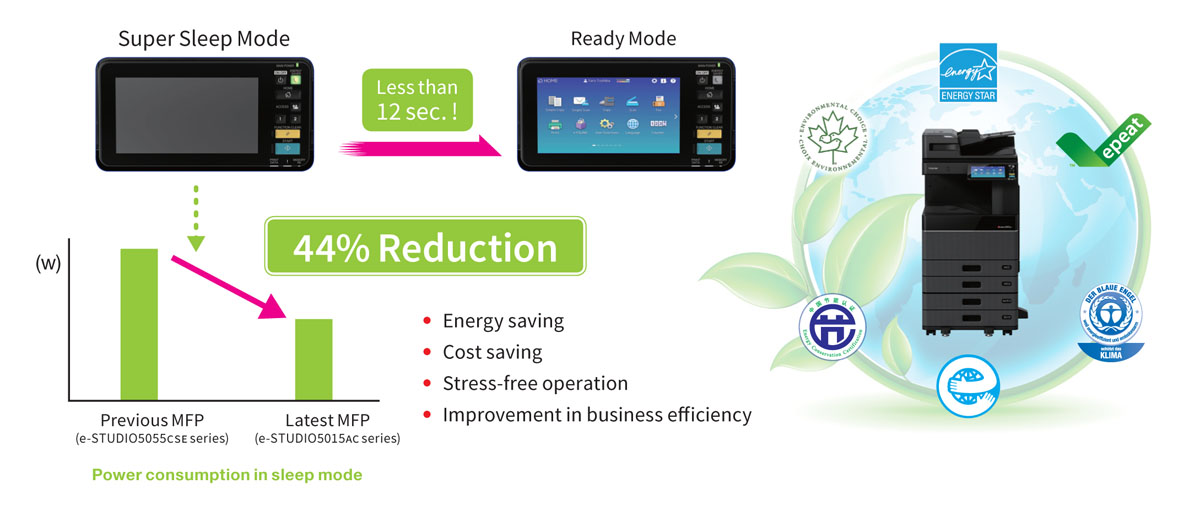
Toshiba’s MFPs will help businesses who want to reduce their power consumption and contribute positively to the global environment without sacrificing business efficiency.
The Toshiba e-STUDIO e-BRIDGE Next Series of MFD Products through its global design and manufacturing process, complies with the following international environmental standards with certifications in various overseas markets.
ENERGY STAR® is a United States, Japanese and Taiwanese certified international standard for energy efficiency consumer products originating in the United States of America and has since been adopted by Australia and New Zealand. Devices carrying the Energy Star service mark, generally use 20-30% less energy than required by federal standards.
EPEAT is a United States certification where registered products meet strict environmental criteria that address the full product life-cycle, from energy conservation and toxic materials to product longevity and end-of-life management. EPEAT registered products offer a reduced environmental impact across their life-cycles.
The Blue Angel (Der Blaue Engel) is a German certification for products and services that have environmentally friendly aspects. Blue Angel is the oldest ecolabel in the world, and it covers some 10,000 products in some 80 product categories.>
The Waste Electrical and Electronic Equipment (WEEE2) Directive governs how manufacturers and retailers in Europe behave in regards to recycling. The regulations require businesses to ensure that when they place products on the UK market that they take responsibility for the recycling costs of those products once they have reached the end of their life.
Toshiba TEC UK fully complies with the WEEE2 Directive with device recycling schemes available for all customers. Working together with DHL Environmental Solutions, Approved Authorised Treatment Facilities (AATF) who collect the WEEE. The treatment facility is targeted by the Environment Agency to produce the maximum amount of re-usable product with a minimum target of 65% of returned WEEE.
MiD and Toshiba encourage all users to recycle all their devices and consumables for re-use wherever possible. Lowering the pressure for new materials on the earth’s natural resources and reducing the risk of potentially hazardous substances entering landfill.
Toshiba works with accredited re-processors to recycle waste produced by the Toshiba TEC offices and adhere to the Packaging and Recovery Notes System (PRN). The PRN system enables packaging producers to carry out their obligations to recycle packaging waste through purchasing PRNs and PERNs. This provides evidence of the recovery or recycling being carried out and is a substitute for businesses meeting their obligation through their own recycling efforts.
Re-processors generate income through the sale of Packaging Recovery Notes, which can then be reinvested in recycling projects to ensure that the UK meets its obligations under European regulations. As such PRNs are investment tools that ensure recycling and recovery continue to grow.
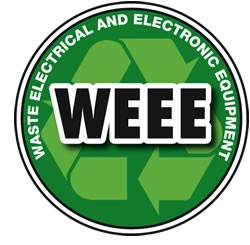
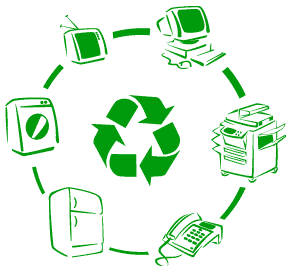
We all have a role to play in building a better future. For Epson, being a sustainable company means being mindful of every aspect of their organisation – from the smallest lightbulb to the largest factory. It fuels Epson’s innovation, drives their growth, motivates their workforce, and, ultimately, contributes to society’s global efforts.
Epson’s heat-free inkjet technology uses their own cold process that requires no drums, fusers, transfer belts, etc., reducing the number of components in the device, and the number of replacements needed over time. Specially designed extra large ink packs require less materials to produce and package and have to be replaced less often, saving resources, time and money.
Laser printers have to wait until they heat up to 200 degrees, but Epson’s heat-free devices require no warm-up and time print in under 5 seconds, before many lasers have even warmed up. Laser devices kick out a lot of heat, but that’s not a problem with Epson’s heat-free inkjet technology which reduces your ozone gas emissions and uses up to 83% less energy.
Even the inkjet technologies used by other manufacturers require heat in the print head, but Epson’s heat-free inkjet technology means lower energy use and reduced ozone gas emissions.
The same focus is visible in how Epson works with partners across the supply chain, both in procurement and supply. Epson have integrated environmental thinking into the design of every device they manufacture, from the procurement and use of materials, to developing low power systems, all focusing on minimising their impact on our environment. Below are some of the representative environmental performance features that Epson evaluate as part of their DfE process.
Epson explores a number of different hardware and software approaches to save energy. These can include anything from developing energy-efficient technologies, to implementing low-power product control systems. Epson strives to realise low-power products by setting and attaining demanding numeric targets several years out for each device and model.
Epson sets size and weight targets for products, since reducing these can help significantly to mitigate environmental impacts, not only because fewer materials are consumed but also because smaller products require less packaging and can be transported and warehoused more efficiently.
Epson also makes every effort to design products so as to minimize waste at the customer’s end. In addition to reduced device packaging, this is done by minimizing the amount of packaging used for consumables, with larger ink capacities in ink packs which also require reduced material content to contain the inks, and by providing new printing functions that eliminate unnecessary prints.
Epson design products to be easy to recycle after use. Specifically, they try to achieve a recyclable rate of 75% or better, as estimated from product engineering drawings.
Recyclable rate = recyclable materials as a percentage of total product weight, excluding materials used as reducing agents in blast furnaces or as fuel sources.
Epson standards specify which substances are prohibited from inclusion in products and substances whose inclusion must be controlled. Information on these substances is gathered in a database to help ensure safety in all processes, from design and procurement to volume production. Strict controls ensure the safety of Epson’s staff, end users, and the environment.
MiD supplies the full range of Sharp printers, encompassing Sharp multifunctional printers and copiers, office desktop MFPs and light production printers, as well as their range of audio visual solutions for offices, retail and education. Sharp has always been a leader, inventing or developing the technology in many of the devices we use in the office or in our homes today.
Environmental responsibility is in Sharp`s DNA. The Ever Sharp pencil, invented by its founder Tokuji Hayakawa, was the product behind the brand name – Sharp. Since it also turned an everyday disposable item into something reusable, saving precious wood along the way, it could also be considered our first environmentally responsible product.
All of Sharp’s factories and most of their offices meet the ISO 14001 standard: a framework that sets out the requirements for environmental management systems. They actively encourage environmental management and green awareness initiatives throughout their entire organisation.
In 2004, Sharp made becoming an environmentally advanced company part of their core philosophy. Sharp was the first manufacturer to receive the EU Eco Label for a TV and most Sharp multi-functional printers have been awarded and certified for their energy-saving and environmentally friendly characteristics.
Hundreds of Sharp products have received international awards for their outstanding eco-friendly design, demonstrating a commitment to producing environmentally friendly products which in turn enable them to achieve their aim of becoming an environmentally advanced company.
Sharp began pioneering solar technology in 1959, and today, Sharp solar technology can be found in homes, farms, factories, solar parks and public buildings around the world. Many of Sharp’s products make use of long-life LEDs which consume minimal amounts of electricity and yet have a long life span.
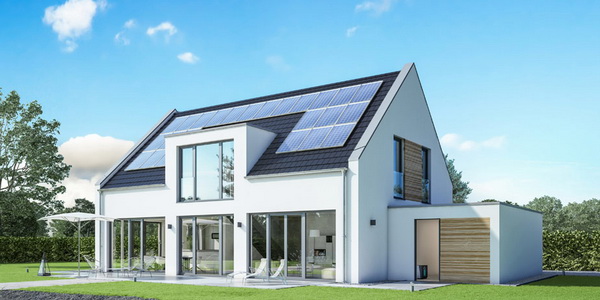 Sharp’s ‘Green Product Guidelines’ govern the entire lifecycle of every single product that they produce. Sharp strives for low energy consumption, reduced waste, less packaging, better recycling and products with a longer life.
Sharp’s ‘Green Product Guidelines’ govern the entire lifecycle of every single product that they produce. Sharp strives for low energy consumption, reduced waste, less packaging, better recycling and products with a longer life.


If you are looking for a printer, display, IT, or telecoms, MiD should be your be your first port of call.</small /p>
Epson printers, Epson copiers, Epson multifunction devices, Epson Heat Free Inkjet Technology, Epson large format printers, Epson large format plotters
HP printers, HP copiers, HP multifunction devices, HP large format designjet printers, HP large format plotters, HP large format scanners
Lexmark printers, Lexmark copiers, Lexmark multifunction devices
OKI printers, OKI copiers, OKI multifunction devices, OKI 4 colour and 5 colour graphics printers
Sharp printers, Sharp copiers, Sharp multifunction devices, Sharp digital signage, Sharp touchscreens, Sharp video walls
Toshiba printers, Toshiba copiers, Toshiba multifunction devices, Toshiba Carbon Zero Devices, Toshiba digital signage, Toshiba touchscreens, Toshiba video walls
Epson copiers & printers in Sheffield Leeds Manchester Stockport Liverpool Birmingham London Newcastle
HP copiers & printers in Sheffield Leeds Manchester Stockport Liverpool Birmingham London Newcastle
Lexmark copiers & printers in Sheffield Leeds Manchester Stockport Liverpool Birmingham London Newcastle
OKI copiers & printers in Sheffield Leeds Manchester Stockport Liverpool Birmingham London Newcastle
Sharp copiers & printers in Sheffield Leeds Manchester Stockport Liverpool Birmingham London Newcastle
Toshiba copiers & printers in Sheffield Leeds Manchester Stockport Liverpool Birmingham London Newcastle